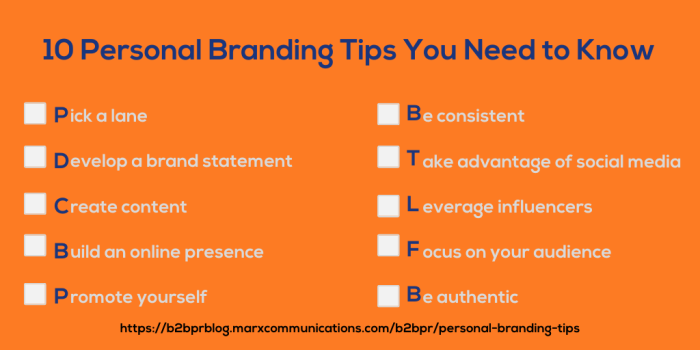Personal Branding Tips takes center stage, beckoning readers into a world of knowledge and creativity, ensuring an absorbing and original reading experience. In today’s competitive market, establishing a strong personal brand is essential for professionals to stand out and succeed. From defining your brand to optimizing your online presence, this guide will provide you with the tips and strategies needed to elevate your personal brand to new heights.
Importance of Personal Branding

In today’s digital age, personal branding has become more important than ever before. With the rise of social media and online presence, professionals need to establish a strong personal brand to stand out in a competitive market.
Standing Out in a Competitive Market
Personal branding allows professionals to differentiate themselves from others in their field. By showcasing their unique skills, experiences, and values, individuals can attract the attention of potential employers or clients. For example, entrepreneur Gary Vaynerchuk has effectively leveraged personal branding to build a successful career as a motivational speaker and business owner. His authentic and engaging online presence has helped him stand out in the crowded business world.
Building Credibility and Trust
A strong personal brand can also help professionals build credibility and trust with their audience. By consistently delivering valuable content and demonstrating expertise in their field, individuals can establish themselves as thought leaders. For instance, author and speaker Brené Brown has built a loyal following by sharing her insights on vulnerability and courage. Her strong personal brand has helped her connect with a wide audience and gain the trust of readers and listeners.
Creating Opportunities
Personal branding can open doors to new opportunities and career advancement. When professionals have a clear and compelling personal brand, they are more likely to attract collaborations, speaking engagements, and job offers. One example is social media influencer and fitness expert Kayla Itsines, who has used her personal brand to launch successful workout programs and partner with major fitness brands.
Her consistent branding has helped her grow her business and reach a global audience.
Building Your Personal Brand
Defining your personal brand is crucial for standing out in a crowded digital world. Here are some step-by-step tips on how to define your personal brand:
Step 1: Identify Your Values and Passions
- Reflect on what matters most to you and what you are passionate about.
- Consider your core values and beliefs that drive your actions and decisions.
Step 2: Define Your Unique Strengths
- Identify your key strengths, skills, and talents that set you apart from others.
- Highlight what makes you unique and valuable to your target audience.
Step 3: Determine Your Target Audience
- Understand who you want to connect with and influence through your personal brand.
- Define your target audience’s demographics, interests, and needs to tailor your brand messaging.
Importance of Authenticity
Being authentic is essential in building a strong personal brand that resonates with your audience. Authenticity builds trust and credibility, establishing genuine connections with your followers. Remember to stay true to yourself and your values throughout your branding efforts.
Creating a Consistent Brand Across Platforms
To maintain a consistent personal brand across different platforms, consider the following strategies:
- Use the same profile picture, bio, and messaging across all social media platforms.
- Ensure your tone of voice and content style remain consistent to reinforce your brand identity.
- Engage with your audience regularly and respond to comments and messages to create a cohesive brand experience.
Online Presence and Personal Branding
In today’s digital age, having a strong online presence is crucial for personal branding. Your online presence serves as a digital resume, showcasing your skills, expertise, and personality to a global audience. It is often the first impression people will have of you, so it’s important to make it count.
Optimizing Social Media Profiles
Your social media profiles play a significant role in shaping your personal brand. Here are some tips to optimize them:
- Use a professional profile picture that reflects your personal brand.
- Craft a compelling bio that highlights your skills and passions.
- Regularly update your profiles with relevant content that resonates with your audience.
- Engage with your followers by responding to comments and messages in a timely manner.
Creating Engaging Content, Personal Branding Tips
Creating engaging content is key to building a strong personal brand online. Here are some tips to help you create content that aligns with your personal brand:
- Identify your target audience and tailor your content to their interests and needs.
- Showcase your expertise by sharing valuable insights, tips, and resources.
- Be authentic and genuine in your content to build trust with your audience.
- Experiment with different types of content, such as videos, blog posts, and infographics, to keep your audience engaged.
Networking and Personal Branding
Networking plays a crucial role in enhancing your personal brand by expanding your connections and opportunities. Building a strong network can help promote your brand and open doors to new possibilities.
Strategies for Effective Networking
- Attend industry events and conferences to meet professionals in your field.
- Utilize social media platforms like LinkedIn to connect with like-minded individuals.
- Join networking groups or organizations to expand your reach and visibility.
- Offer to help others in your network to strengthen relationships and build trust.
Leveraging Connections to Strengthen Your Brand
- Seek mentorship from established professionals in your industry to gain valuable insights and guidance.
- Collaborate with others on projects to showcase your skills and expertise to a wider audience.
- Ask for recommendations and testimonials from your connections to build credibility and trust.
- Stay in touch with your network regularly to maintain relationships and stay top of mind.
Personal Branding for Career Growth: Personal Branding Tips

Personal branding plays a crucial role in shaping your career growth and opening up new opportunities in the professional world. By strategically cultivating and promoting your personal brand, you can attract job offers, advance your career, and build a strong professional reputation.
Using Your Personal Brand to Attract Job Offers
Building a strong personal brand can make you stand out to potential employers and recruiters. Here are some tips on using your personal brand to attract job offers:
- Showcase your expertise and skills through online platforms like LinkedIn and personal websites.
- Create valuable content related to your industry to establish yourself as a thought leader.
- Engage with industry professionals and participate in networking events to expand your reach.
- Consistently monitor and update your online presence to reflect your current accomplishments and goals.
Advancing Your Career with Personal Branding
Your personal brand can help you advance your career by creating visibility and credibility within your industry. Here are some ways to leverage your personal brand for career growth:
- Seek opportunities to speak at conferences or events to showcase your expertise and network with industry leaders.
- Collaborate with other professionals in your field to expand your knowledge and reach a wider audience.
- Consistently seek feedback and improve upon your skills to stay relevant in a competitive job market.
Importance of Personal Branding in Building a Professional Reputation
Building a strong personal brand is essential for creating a positive professional reputation. When you consistently deliver value, maintain authenticity, and showcase your expertise, you establish credibility and trust with colleagues, clients, and employers. Your personal brand is a reflection of your professional identity and can significantly impact your career trajectory.